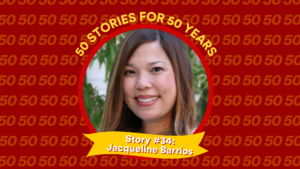 Story #34: Jacqueline Barrios
Story #34: Jacqueline Barrios
When interviewing Jacqueline Barrios, former educator at Foshay Learning Center with the USC Neighborhood Academic Initiative, one could just tell how passionate she is about her work even years after she transitioned into her academic teaching career. Now a professor at the University of Arizona, she credits her work with JEP and NAI for giving her room to explore what she was capable of to eventually make it to her current position. “Every time I had an idea, if I needed a partner I was able to go to JEP. They gave me a sense of a customized relationship support to bring about these initiatives that I knew would be important to our students. It gave me a language of what can actually be possible, how I could actually become a professor. I knew JEP didn’t just care about me because of what I could do for them, they cared about me as an individual, as a first-gen student in the community.” she said.
Thinking back to the beginnings of NAI and JEP’s partnership, Barrios remembers that she felt like all the great initiatives were missing out on the opportunity to enmesh the community and USC. “I always thought of it as ships passing in the night. We were sending our students to USC and USC was sending their students into the community. And don’t get me wrong, that was really helpful – but I felt like there was such a big opportunity to really combine the two and bring us together, also on an intellectual level. And through our partnership with JEP, it became possible. Our students were no longer just sitting in a USC classroom, they were sitting there, learning from a USC professor with USC students at the same time. They got to work together in group projects, assignments, classroom exchanges. It was really amazing to see how relationships were built that way. JEP helped create a lot of prototypes of ways to bring the community and the university truly together in shared spaces – whether that was freshman seminars, mentorships, or other initiatives that we worked on together.”
Now, in her work at the University of Arizona, she still helps to facilitate these relationships. “JEP has not only influenced my pathway to becoming a professor in that it taught me about work in academia in general but it also illustrated the importance of community engagement from a faculty and administrative standpoint.” she said. “In general, what’s missing in community engagement and university and community partnerships is the co-creation of knowledge and the real need for there to be reciprocity and horizontality with that rarified resource. It shouldn’t be about reproducing the same model of power relationship, instead, the goal should be to become an equal partners. It’s about constantly evolving and not just maintaining the status quo – both on an individual and on an institutional level. For example, with my personal development, I loved my job with Foshay and NAI but I knew that by becoming a professor at a university, I would have more opportunities to create change – especially with my unique background of having worked on the other side before.”